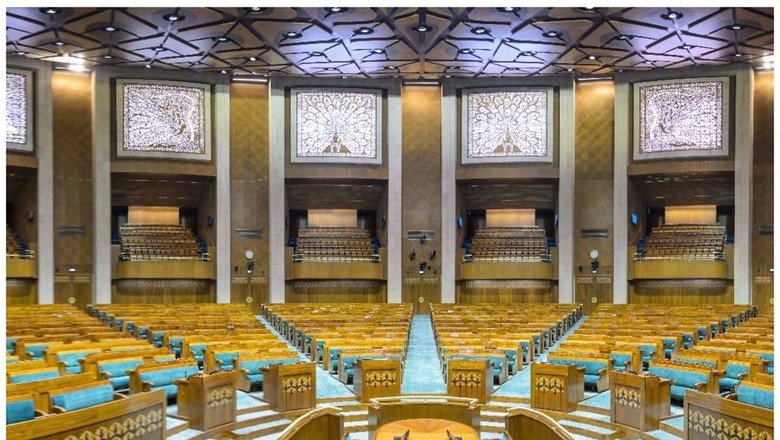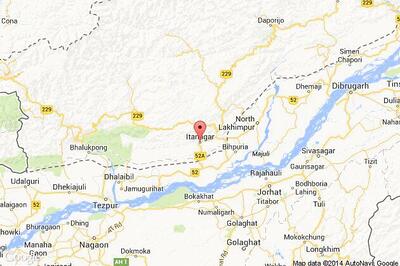
views
India has a new Parliament building. There was controversy about whether the country needed to replace the old Parliament. Some people felt that there was scope to refurbish the old, rather than spend so much money on a new one. Others believed that, although built by the British, the old building was replete with historical memories of the making of new India, and should have been retained.
Whatever the differences in opinion, the fact is that India has a new Parliament, built by Indians, and by all accounts beautiful, modern and far more spacious premises, which will be better suited to meet our needs in the future.
There was controversy also on Prime Minister Narendra Modi inaugurating the building. My own view is that it would have been more appropriate, on such a momentous occasion, to have the President of India doing the honours. The PM is the head of government; but the President, under Article 79 of the Constitution, is the head of Parliament. In fact, as per this article, the Parliament consists of the President and the two houses of the Lok Sabha and Rajya Sabha. She convenes Parliament, prorogues it, and dissolves it. It is she too who formally inaugurates the Budget Session of Parliament.
The President is above politics, while the PM is the head of government, but also the leader of a specific political party. Since Parliament belongs to all political parties, it would have been befitting for the head of state to dedicate this new temple of democracy to the people of India. If she would have come, then the Vice-President, who chairs the Rajya Sabha, could also have been present. As it so happened, the two key figures in our Parliament, the President who heads it, and the Vice-President who chairs the Rajya Sabha, were both absent, possibly watching the resplendent ceremony, of which they should have been an intrinsic part, on TV. The argument that some state legislatures have also been inaugurated by Congress leaders and not by the Governors of those states is valid, but one wrong does not justify another, especially where it’s a question of the correct procedure — substantially and ceremonially — pertaining to the national Parliament.
But this being said, it was an impressive ceremony. The criticism of the installation of the Sengol was, to my mind, entirely unnecessary. India is a secular nation, but secularism does not mean being anti-religion. It is for this reason that the national symbol of the country is the three lions, taken from King Ashok’s reign, who was a Buddhist. That is why too, no one has raised any objection to the PM’s speech on Independence Day every year, from the ramparts of the Red Fort, which was built by Emperor Shahjahan, who was a devout Muslim and had a beautiful mosque within his palace. At the very entrance of Parliament is a saying from the Upanishads: ‘Udaar Charitanam Vasudhaiva Kutumbakam: For the big-hearted, the entire world is a family’. The inauguration ceremony had an all-faith prayer meeting.
If, in addition, a symbol of the transfer of power, given by the Aadheenam Matha in Madurai on 14th August 1947, whether to Lord Mountbatten or Jawaharlal Nehru, has been rediscovered and reclaimed from anonymity in Allahabad Museum, and installed in the new Parliament, why create a self-defeating controversy over it? The Sengol, symbolising the transfer of power from one king to another, was a hoary tradition of the powerful, highly refined and long-reigning Chola dynasty from Tamil Nadu. The decision to give it a new prominence — as representing the return of sovereignty to the people of India — deserves to be welcomed, even if belatedly.
The real challenge for us is to ensure that the new Parliament conducts its proceedings in a manner that is commensurate with its physical grandeur. We may take pride in claiming to be the world’s largest democracy, but the ruckus, disruption, cacophony and perennial adjournments of our Parliamentary sessions are hardly a worthy advertisement for that. Only rarely — very rarely — does Parliament see a lucid, calm, and reasoned debate. Nor do we have any more displays of erudition, repartee, humour and eloquence that used to be so common in the past. On the contrary, the level of discourse has become so coarse that it puts us to shame. The behaviour of our parliamentarians would be an adequate role model for a fish bazaar, with legislators screaming slogans, entering the well, carrying placards, hurling abuses, breaking mikes and tables, and even threatening the physical safety of the presiding officers. The net result is that important Bills — including the Budget — are passed without discussion, and very few are sent for considered examination to Select Committees.
How can we change this state of affairs? We seem to be caught in a vicious circle. When the BJP was in Opposition, two of its tallest democrats, Arun Jaitley and Sushma Swaraj — leaders of Opposition in the Rajya Sabha and Lok Sabha respectively — gave ideological justification for the disruption of Parliament, calling it also a form of democracy. Now when the BJP occupies the Treasury Benches, the Opposition follows the same principle. The political atmosphere in general has become so bitter and acrimonious, that there is hardly any scope left for civilised dialogue.
It is normally accepted that it is the duty of the Treasury Benches to run the House. Rajiv Shukla, then Minister for Parliamentary Affairs in the UPA government, once told me that Pranab Mukherjee, the leader of the house in the Rajya Sabha, used to scold him if he did not spend enough time with Opposition leaders. The reason for this was — and remains — that there needs to be greater trust and respect for each other on both sides of the aisle. The onus for this lies on both sides. The ruling party must allow the Opposition to raise issues which it considers a priority. It must also not use its brute majority to stream role legislation and be willing to have a debate. For its part, the Opposition should learn greater self-discipline and not break Parliamentary protocol almost on a daily basis.
Our new Parliament will really be worth its investment if it also inaugurates a new era of Parliamentary decorum. Is that too much to ask for?
The author is a former diplomat, an author and a politician. The views expressed in this article are those of the author and do not represent the stand of this publication.


















Comments
0 comment